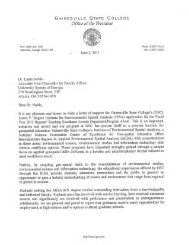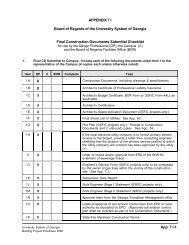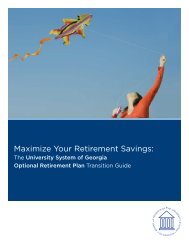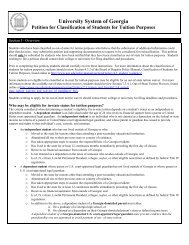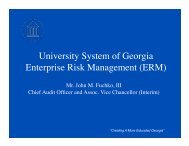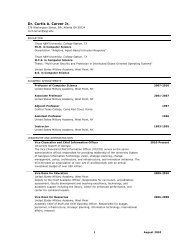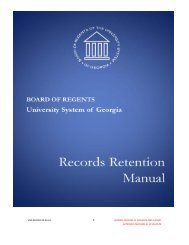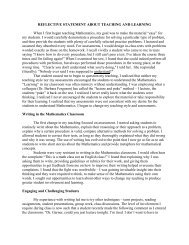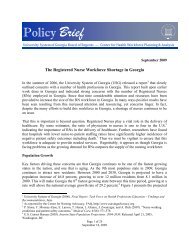66858 Federal Register / Vol. 75, No. 209 / Friday, October 29, 2010 / Rules and RegulationsWReier-Aviles on DSKGBLS3C1PROD with RULES2State Authorization (§§ 600.4(a)(3),600.5(a)(4), 600.6(a)(3), 600.9, and668.43(b))General—No Mandate for a StateLicensing AgencyComment: Several commentersbelieved the proposed regulationswould create mandates for States tocreate new State oversight bodies orlicensing agencies, or compel States tocreate bureaucratic structures thatwould further strain higher educationresources. Some commenters believedthat a majority <strong>of</strong> the States would haveto modify licensing requirements oradopt new legislation and that theregulations would cause a major shift inState responsibility.Discussion: These final regulations donot mandate that a State create anylicensing agency for purposes <strong>of</strong> Federalprogram eligibility. Under the finalregulations, an institution may belegally authorized by the State based onmethods such as State charters, Statelaws, State constitutional provisions, orarticles <strong>of</strong> incorporation that authorizean entity to <strong>of</strong>fer educational programsbeyond secondary education in theState. If the State had an additionalapproval or licensure requirement, theinstitution must comply with thoserequirements. In the case <strong>of</strong> an entityestablished as a business or nonpr<strong>of</strong>itcharitable organization, i.e., not as aneducational institution, the entity wouldbe required to have authorization fromthe State to <strong>of</strong>fer educational programsbeyond secondary education. Whilethese final regulations require thecreation <strong>of</strong> a State licensing agency, aState may choose to rely on such anagency to legally authorize institutionsto <strong>of</strong>fer postsecondary education in theState for purposes <strong>of</strong> Federal programeligibility.Changes: None.Comment: Several commenterssupported the proposed regulations asan effort to address fraud and abuse inFederal programs through Stateoversight. An association representingState higher education <strong>of</strong>ficials notedthat despite differences in Statepractice, all the States, within ourFederal system, have responsibilities toprotect the interests <strong>of</strong> students and thepublic in postsecondary education andsupported the basic elements <strong>of</strong>proposed § 600.9. A State agency <strong>of</strong>ficialpraised the <strong>Department</strong>’s proposedregulations but suggested that the<strong>Department</strong> insert ‘‘by name’’ in theproposed § 600.9(a)(1) to provide someprotection against recurrence <strong>of</strong>situations such as the one in Californiawhen the State licensing agency lapsedprior to the State renewing the agencyor a successor to the agency and noState approval was in place that namedan institution as licensed or authorizedto operate in the State.Discussion: We appreciate the support<strong>of</strong> the commenters. We agree with thecommenter that a State’s authorizationshould name the institution beingauthorized. We believe that by namingthe institution in its authorization forthe institution to <strong>of</strong>fer postsecondaryeducation in the State, the State isproviding the necessary positiveauthorization expected under § 600.9.Changes: We are amending proposed§ 600.9, where appropriate, to recognizethat an institution authorized by namein a State will meet the Stateauthorization requirements as discussedfurther in response to other comments.Comment: Some commenters believedthat the proposed regulations exceededthe <strong>Department</strong>’s authority andinfringed on the States’ authority. Onecommenter requested that the proposedregulations be eliminated becauseprivate institutions are authorizedthrough various unique authorizations.Another commenter believed that theproposed regulations upset the balance<strong>of</strong> the ‘‘Triad’’ <strong>of</strong> oversight by States,accrediting agencies, and the FederalGovernment. One commenterquestioned whether the <strong>Department</strong>could impose conditions restricting aState’s freedom <strong>of</strong> action in determiningwhich institutions are authorized by theState by requiring that a State’sauthorization must be subject to, forexample, adverse actions and provisionfor reviewing complaints. Thecommenter believed that there was nointent to have the <strong>Department</strong> imposesuch conditions. Another commenterbelieved that proposed § 600.9unnecessarily intruded on each State’sprerogative to determine its own lawsand regulations relative to theauthorization <strong>of</strong> higher educationinstitutions and to define the conditionsfor its own regulations. One commentersuggested that the <strong>Department</strong> onlyapply proposed § 600.9 to the problemareas that the commenter identified assubstandard schools, diploma mills, andprivate proprietary institutions.One commenter believed that theproposed regulations would infringeupon the States’ sovereignty bycommanding state governments toimplement legislation enacted byCongress. Specifically, the commenternoted that under the proposedregulations the States must adoptlegislation or rules that expresslyauthorize institutions to <strong>of</strong>ferpostsecondary programs and furthermake such an authorization subject toadverse action by the State and that theVerDate Mar2010 14:10 Oct 28, 2010 Jkt 223001 PO 00000 Frm 00028 Fmt 4701 Sfmt 4700 E:\FR\FM\29OCR2.SGM 29OCR2proposed regulations would require thatStates establish a process to act oncomplaints about the institution andenforce State laws against theinstitution. The commenter believedthat the <strong>Department</strong> would improperlydirect State <strong>of</strong>ficials to participate in theadministration <strong>of</strong> a federally enactedregulatory scheme in violation <strong>of</strong> StateSovereignty. By doing so, thecommenter believed that the FederalGovernment would be forcing Stategovernments to absorb the financialburden <strong>of</strong> implementing a Federalregulatory program, while allowing theFederal government to take credit for‘‘solving’’ problems without having toask their constituents to pay for thesolutions with higher Federal taxes. Thecommenter believed that the<strong>Department</strong> cannot construe the HEA torequire a State to regulate according tothe <strong>Department</strong>’s wishes. Thecommenter believed that such aconstruction would exceed the<strong>Department</strong>’s authority under the HEAand violate the States’ rights under theTenth Amendment.Discussion: We disagree with thecommenters that the proposedregulations exceed the <strong>Department</strong>’sauthority and infringe on States’authority. Under the provisions <strong>of</strong> theHEA and the institutional eligibilityregulations, the <strong>Department</strong> is requiredto determine whether an institution islegally authorized by a State to <strong>of</strong>ferpostsecondary education if theinstitution is to meet the definition <strong>of</strong> aninstitution <strong>of</strong> higher education,proprietary institution <strong>of</strong> highereducation, or postsecondary vocationalinstitution (20 U.S.C. 1001 and 1002) asthose terms are defined in §§ 600.4,600.5, and 600.6 <strong>of</strong> the institutionaleligibility regulations. In accordancewith the provisions <strong>of</strong> the HEA, the<strong>Department</strong> is establishing minimumstandards to determine whether aninstitution is legally authorized to <strong>of</strong>ferpostsecondary education by a State forpurposes <strong>of</strong> Federal programs. Theproposed regulations do not seek toregulate what a State must do, butinstead considers whether a Stateauthorization is sufficient for aninstitution that participates, or seeks toparticipate, in Federal programs.Contrary to the commenter’ssuggestion that the <strong>Department</strong> isupsetting the Triad, we believe theseregulations clarify the role <strong>of</strong> the States,a key participant in the Triad, inestablishing an institution’s eligibilityfor Federal programs. Further, the<strong>Department</strong> believes that clarifying theState role in the Triad will address some<strong>of</strong> the oversight concerns raised by
Federal Register / Vol. 75, No. 209 / Friday, October 29, 2010 / Rules and Regulations66859WReier-Aviles on DSKGBLS3C1PROD with RULES2another commenter regarding problemareas with certain types <strong>of</strong> institutions.Changes: None.Comment: Several commentersquestioned the need for proposed§ 600.9. For example, severalcommenters questioned whether the<strong>Department</strong>’s concern that the failure <strong>of</strong>California to reinstate a State regulatoryagency was justified. Commentersbelieved that the regulations would nothave prevented the concerns the<strong>Department</strong> identified in the case <strong>of</strong> thelapsing <strong>of</strong> the California State agency.One commenter believed the Californiaissue was resolved and thataccreditation and student financial aidprocesses worked. Some commentersbelieved that the current Stateregulatory bodies or other authorizationmethods were sufficient. Onecommenter stated that authorizationsare spelled out in State statutes, andthere is no need for the regulations.Some commenters believed thatadditional information is needed, suchas a State-by-State review <strong>of</strong> the impact<strong>of</strong> proposed § 600.9, or the States withadequate or inadequate oversight.Several commenters were concernedthat proposed § 600.9 wouldunnecessarily impact small Stateswithout discernable problems. Somecommenters believed there is noevidence <strong>of</strong> marginal institutionsmoving to States with lower standardsand that there is no danger to title IV,HEA program funds. One commenterbelieved that proposed § 600.9 shouldbe eliminated because the commenterbelieved that its full effect is not knownand that it will be chaotic ifimplemented. Another commenterbelieved that proposed § 600.9 would beburdensome, is not economicallyfeasible, and would leave an institutionat the mercy <strong>of</strong> the State. Onecommenter believed that proposed§ 600.9 would encourage for-pr<strong>of</strong>itinstitutions to undermine State agenciessuch as through lobbying to underfundan agency and would stallreconsideration <strong>of</strong> legislation.Some commenters believed that the<strong>Department</strong>’s concerns were valid. One<strong>of</strong> these commenters believed that, inthe absence <strong>of</strong> regulations, many Stateshave forfeited their publicresponsibilities to accrediting agencies.In the case <strong>of</strong> the interim lapse <strong>of</strong> theState regulatory agency in California,the commenter believed that we do notknow yet the extent <strong>of</strong> the mischief thatmay have occurred or may still occur,but the commenter has received reportsthat schools began operating in the gapperiod and are being allowed tocontinue to operate without Stateapproval until the new agency isoperational. The commenter understoodthat at least one <strong>of</strong> those schools closedabruptly, leaving many students withdebts owed and no credential to showfor their efforts.Some commenters believed that theproposed regulations would not addressissues with degree mills as they are notaccredited. Some commenters urged the<strong>Department</strong> to <strong>of</strong>fer leadership andsupport <strong>of</strong> Federal legislation andfunding to combat diploma mills.One commenter recommended thatthe <strong>Department</strong> use Federal funds foroversight. Another commentersuggested that the <strong>Department</strong>encourage the Federal Government toprovide incentives to the States.Discussion: We do not agree with thecommenters who believe that proposed§ 600.9 should be eliminated. Forexample, we believe these regulationsmay have prevented the situation inCalifornia from occurring or would havegreatly reduced the period <strong>of</strong> timeduring which the State failed to provideadequate oversight. While it may appearthat the California situation wassatisfactorily resolved as somecommenters suggested, the absence <strong>of</strong> aregulation created uncertainty. As onecommenter noted, during the periodwhen the State failed to act, it appearsthat problems did occur, and that noprocess existed for new institutions toobtain State authorization after thedissolution <strong>of</strong> the State agency. We areconcerned that States have notconsistently provided adequateoversight, and thus we believe Federalfunds and students are at risk as wehave anecdotally observed institutionsshopping for States with little or nooversight. As a corollary effect <strong>of</strong>establishing some minimal requirementsfor State authorization for purposes <strong>of</strong>Federal programs, we believe the publicwill benefit by reducing the possibilitiesfor degree mills to operate, without theneed for additional Federal interventionor funding. We do not believe thatadditional information is needed tosupport § 600.9 in these finalregulations as § 600.9 only requires aninstitution demonstrate that it meets aminimal level <strong>of</strong> authorization by theState to <strong>of</strong>fer postsecondary education.Because the provisions <strong>of</strong> § 600.9 areminimal, we believe that many Stateswill already satisfy these requirements,and we anticipate institutions in allStates will be able to meet therequirements under the regulations overtime. This requirement will also bringgreater clarity to State authorizationprocesses as part <strong>of</strong> the Triad. Since thefinal regulations only establish minimalstandards for institutions to qualify aslegally authorized by a State, we believeVerDate Mar2010 14:10 Oct 28, 2010 Jkt 223001 PO 00000 Frm 00029 Fmt 4701 Sfmt 4700 E:\FR\FM\29OCR2.SGM 29OCR2that, in most instances they do notimpose significant burden or costs.States are also given numerous optionsto meet these minimum requirements ifthey do not already do so, and thisflexibility may lead to some States usingdifferent authorizations for differenttypes <strong>of</strong> institutions in order tominimize burden and provide betteroversight. The question <strong>of</strong> whether theseregulations will impact the ability <strong>of</strong>any group to seek changes to a State’srequirements is beyond the purview <strong>of</strong>these final regulations. As onecommenter requested, we will continueto support oversight functions asprovided under Federal law, and webelieve that these final regulations willprovide the necessary incentives to theStates to assure a minimal level <strong>of</strong> Stateoversight.Changes: None.Comment: Some commentersquestioned how the <strong>Department</strong> wouldenforce the proposed regulations. Onecommenter stated that the <strong>Department</strong>has no mechanism to enforce theproposed regulations and asks how theywill improve program integrity. Onecommenter questioned why aninstitution may be held accountable forthe actions <strong>of</strong> the State over which it hasno direct control.Discussion: Any institution applyingto participate in a Federal programunder the HEA must demonstrate that ithas the legal authority to <strong>of</strong>ferpostsecondary education in accordancewith § 600.9 <strong>of</strong> these final regulations. Ifa State declines to provide an institutionwith legal authorization to <strong>of</strong>ferpostsecondary education in accordancewith these regulations, the institutionwill not be eligible to participate inFederal programs.As to an institution’s inability tocontrol the actions <strong>of</strong> a State, we do notbelieve such a circumstance is anydifferent than an institution failing tocomply with an accreditationrequirement that results in theinstitution’s loss <strong>of</strong> accredited status.We believe that in any circumstance inwhich an institution is unable to qualifyas legally authorized under § 600.9 <strong>of</strong>these final regulations, the institutionand State will take the necessary actionsto meet the requirements <strong>of</strong> § 600.9 <strong>of</strong>these final regulations.Changes: None.Comment: One commenter believedthat proposed § 600.9 would result in anunfunded mandate by the FederalGovernment. Another commenter statedthat many States may see proposed§ 600.9 as a revenue-generatingopportunity and pass the costs <strong>of</strong> thisrequirement on to institutions, which
- Page 1 and 2: Friday,October 29, 2010Part IIDepar
- Page 3 and 4: Federal Register / Vol. 75, No. 209
- Page 6 and 7: 66836 Federal Register / Vol. 75, N
- Page 8 and 9: 66838 Federal Register / Vol. 75, N
- Page 10 and 11: WReier-Aviles on DSKGBLS3C1PROD wit
- Page 12 and 13: 66842 Federal Register / Vol. 75, N
- Page 14 and 15: 66844 Federal Register / Vol. 75, N
- Page 16 and 17: WReier-Aviles on DSKGBLS3C1PROD wit
- Page 18 and 19: 66848 Federal Register / Vol. 75, N
- Page 20 and 21: 66850 Federal Register / Vol. 75, N
- Page 22 and 23: WReier-Aviles on DSKGBLS3C1PROD wit
- Page 24 and 25: 66854 Federal Register / Vol. 75, N
- Page 26 and 27: WReier-Aviles on DSKGBLS3C1PROD wit
- Page 30 and 31: 66860 Federal Register / Vol. 75, N
- Page 32 and 33: 66862 Federal Register / Vol. 75, N
- Page 34 and 35: 66864 Federal Register / Vol. 75, N
- Page 36 and 37: 66866 Federal Register / Vol. 75, N
- Page 38 and 39: WReier-Aviles on DSKGBLS3C1PROD wit
- Page 40 and 41: WReier-Aviles on DSKGBLS3C1PROD wit
- Page 42 and 43: 66872 Federal Register / Vol. 75, N
- Page 44 and 45: WReier-Aviles on DSKGBLS3C1PROD wit
- Page 46 and 47: WReier-Aviles on DSKGBLS3C1PROD wit
- Page 48 and 49: WReier-Aviles on DSKGBLS3C1PROD wit
- Page 50 and 51: 66880 Federal Register / Vol. 75, N
- Page 52 and 53: WReier-Aviles on DSKGBLS3C1PROD wit
- Page 54 and 55: 66884 Federal Register / Vol. 75, N
- Page 56 and 57: 66886 Federal Register / Vol. 75, N
- Page 58 and 59: WReier-Aviles on DSKGBLS3C1PROD wit
- Page 60 and 61: WReier-Aviles on DSKGBLS3C1PROD wit
- Page 62 and 63: WReier-Aviles on DSKGBLS3C1PROD wit
- Page 64 and 65: WReier-Aviles on DSKGBLS3C1PROD wit
- Page 66 and 67: WReier-Aviles on DSKGBLS3C1PROD wit
- Page 68 and 69: WReier-Aviles on DSKGBLS3C1PROD wit
- Page 70 and 71: WReier-Aviles on DSKGBLS3C1PROD wit
- Page 72 and 73: 66902 Federal Register / Vol. 75, N
- Page 74 and 75: WReier-Aviles on DSKGBLS3C1PROD wit
- Page 76 and 77: WReier-Aviles on DSKGBLS3C1PROD wit
- Page 78 and 79:
66908 Federal Register / Vol. 75, N
- Page 80 and 81:
WReier-Aviles on DSKGBLS3C1PROD wit
- Page 82 and 83:
66912 Federal Register / Vol. 75, N
- Page 84 and 85:
WReier-Aviles on DSKGBLS3C1PROD wit
- Page 86 and 87:
66916 Federal Register / Vol. 75, N
- Page 88 and 89:
WReier-Aviles on DSKGBLS3C1PROD wit
- Page 90 and 91:
WReier-Aviles on DSKGBLS3C1PROD wit
- Page 92 and 93:
WReier-Aviles on DSKGBLS3C1PROD wit
- Page 94 and 95:
66924 Federal Register / Vol. 75, N
- Page 96 and 97:
WReier-Aviles on DSKGBLS3C1PROD wit
- Page 98 and 99:
66928 Federal Register / Vol. 75, N
- Page 100 and 101:
WReier-Aviles on DSKGBLS3C1PROD wit
- Page 102 and 103:
66932 Federal Register / Vol. 75, N
- Page 104 and 105:
WReier-Aviles on DSKGBLS3C1PROD wit
- Page 106 and 107:
66936 Federal Register / Vol. 75, N
- Page 108 and 109:
66938 Federal Register / Vol. 75, N
- Page 110 and 111:
66940 Federal Register / Vol. 75, N
- Page 112 and 113:
66942 Federal Register / Vol. 75, N
- Page 114 and 115:
66944 Federal Register / Vol. 75, N
- Page 116 and 117:
66946 Federal Register / Vol. 75, N
- Page 118 and 119:
WReier-Aviles on DSKGBLS3C1PROD wit
- Page 120 and 121:
WReier-Aviles on DSKGBLS3C1PROD wit
- Page 122 and 123:
WReier-Aviles on DSKGBLS3C1PROD wit
- Page 124 and 125:
66954 Federal Register / Vol. 75, N
- Page 126 and 127:
WReier-Aviles on DSKGBLS3C1PROD wit
- Page 128 and 129:
66958 Federal Register / Vol. 75, N
- Page 130 and 131:
66960 Federal Register / Vol. 75, N
- Page 132 and 133:
WReier-Aviles on DSKGBLS3C1PROD wit
- Page 134 and 135:
WReier-Aviles on DSKGBLS3C1PROD wit
- Page 136 and 137:
WReier-Aviles on DSKGBLS3C1PROD wit
- Page 138 and 139:
66968 Federal Register / Vol. 75, N
- Page 140 and 141:
66970 Federal Register / Vol. 75, N
- Page 142 and 143:
66972 Federal Register / Vol. 75, N
- Page 144 and 145:
66974 Federal Register / Vol. 75, N



